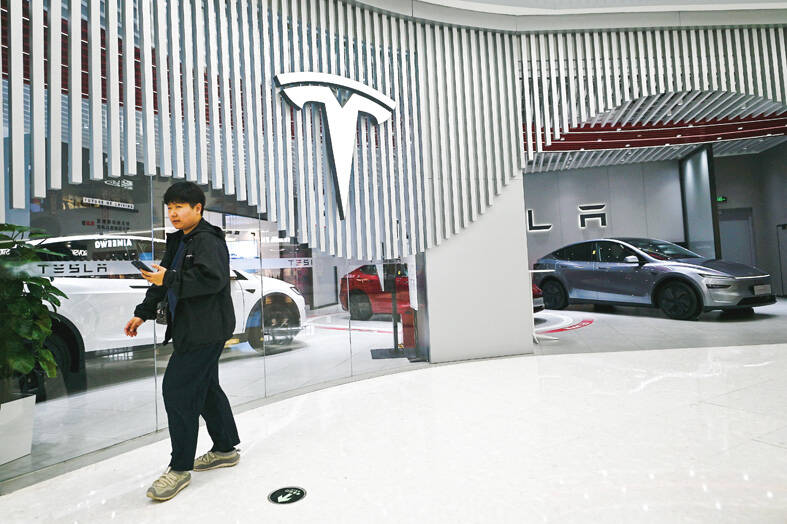Tesla Inc’s Web site in China has removed the ‘order now’ option for Model S and Model X electric vehicles (EV), which are both imported, just days after China retaliated against US President Donald Trump’s tariffs by raising levies of its own.
Tesla’s China Web site was offering an “order now” option for the two models as of the end of last month, an archived screen shot by Wayback Machine showed, but that had been removed as of yesterday. Existing inventory, such as a white Model S for 759,900 yuan (US$103,890), is still available.
Representatives for Tesla in China did not immediately respond to a request for comment.

Photo: AFP
Trump is imposing a 125 percent charge designed to counter the US’ trade deficit with China and punish Beijing for retaliating against US import taxes.
The number, published in a White House memo on Thursday, comes in addition to a 20 percent levy put in place earlier this year over China’s role in fentanyl trafficking, taking total tariffs on China to 145 percent.
China has hit back at the US, raising levies on all US goods to 84 percent.
Beijing has also said it would reduce the number of US films allowed to enter the country.
Tesla’s Shanghai factory only makes Model 3 and Model Y cars and most of them are either sold in China or exported to other parts of Asia. Anyone wanting to buy a Model S or Model X in China needs to get them imported.
However, the Model S and Model X only make a fraction of Tesla’s sales in China, at just less than 2,000 vehicles last year compared to about 661,820 for both the Model 3 and Model Y, data from the China Automotive Technology and Research Center showed.
Even though that would mean a huge hit to Tesla’s sales in the world’s biggest automobile market, Elon Musk’s EV maker has not been going well in China regardless.
Volumes from Tesla’s plant on the outskirts of Shanghai have been falling for six straight months, with first-quarter deliveries seeing a 22 percent decline. One of the largest threats to Tesla in China comes from BYD Co (比亞迪), which is now by far and away China’s No. 1 selling car brand.
Meanwhile, global deliveries for Tesla have slumped to the lowest level in three years, as Musk faces an international backlash over his involvement in politics.

SMART MANUFACTURING: The company aims to have its production close to the market end, but attracting investment is still a challenge, the firm’s president said Delta Electronics Inc (台達電) yesterday said its long-term global production plan would stay unchanged amid geopolitical and tariff policy uncertainties, citing its diversified global deployment. With operations in Taiwan, Thailand, China, India, Europe and the US, Delta follows a “produce at the market end” strategy and bases its production on customer demand, with major site plans unchanged, Delta president Simon Chang (張訓海) said on the sidelines of a company event yesterday. Thailand would remain Delta’s second headquarters, as stated in its first-quarter earnings conference, with its plant there adopting a full smart manufacturing system, Chang said. Thailand is the firm’s second-largest overseas

‘REMARKABLE SHOWING’: The economy likely grew 5 percent in the first half of the year, although it would likely taper off significantly, TIER economist Gordon Sun said The Taiwan Institute of Economic Research (TIER) yesterday raised Taiwan’s GDP growth forecast for this year to 3.02 percent, citing robust export-driven expansion in the first half that is likely to give way to a notable slowdown later in the year as the front-loading of global shipments fades. The revised projection marks an upward adjustment of 0.11 percentage points from April’s estimate, driven by a surge in exports and corporate inventory buildup ahead of possible US tariff hikes, TIER economist Gordon Sun (孫明德) told a news conference in Taipei. Taiwan’s economy likely grew more than 5 percent in the first six months

SUPPLY RESILIENCE: The extra expense would be worth it, as the US firm is diversifying chip sourcing to avert disruptions similar to the one during the pandemic, the CEO said Advanced Micro Devices Inc (AMD) chief executive officer Lisa Su (蘇姿丰) on Wednesday said that the chips her company gets from supplier Taiwan Semiconductor Manufacturing Co (TSMC, 台積電) would cost more when they are produced in TSMC’s Arizona facilities. Compared with similar parts from factories in Taiwan, the US chips would be “more than 5 percent, but less than 20 percent” in terms of higher costs, she said at an artificial intelligence (AI) event in Washington. AMD expects its first chips from TSMC’s Arizona facilities by the end of the year, Su said. The extra expense is worth it, because the company is

The seizure of one of the largest known mercury shipments in history, moving from mines in Mexico to illegal Amazon gold mining zones, exposes the wide use of the toxic metal in the rainforest, according to authorities. Peru’s customs agency, SUNAT, found 4 tonnes of illegal mercury in Lima’s port district of Callao, according to a report by the non-profit Environmental Investigations Agency (EIA). “This SUNAT intervention has prevented this chemical from having a serious impact on people’s health and the environment, as can be seen in several areas of the country devastated by the illegal use of mercury and illicit activities,”